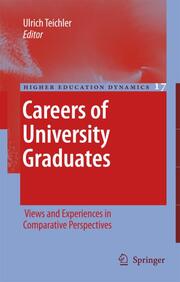Detailansicht
Careers of University Graduates
Views and Experiences in Comparative Perspectives, Higher Education Dynamics 17
ISBN/EAN: 9781402059254
Umbreit-Nr.: 1416806
Sprache:
Englisch
Umfang: vi, 280 S.
Format in cm:
Einband:
gebundenes Buch
Erschienen am 27.04.2007
Auflage: 1/2007
- Zusatztext
- This book offers detailed comparative analyses of graduate employment and work, drawn from a survey of graduates in 11 European countries and Japan. The book shows how transition to employment, job assignments, employee assessments of the quality of employment and work vary by the graduates' socio-biographic and educational background. It demonstrates more substantial differences in the relationships between study and subsequent employment between various countries than previous debates and analyses have suggested.
- Kurztext
- Graduates from institutions of Higher Education do not only hope to get employed and be better paid. Study can also have an impact on employment and work in many respects: facilitating transition to employment, opening up opportunities for demanding, interesting and responsible professional assignments, increasing remuneration and job security, providing opportunities for continuing learning and leading the way to international mobility and visibly international assignments. The book provides a series of detailed analyses of graduate employment and work in comparative perspective. It draws from the survey of graduates from 11 European countries and Japan first published in H. Schomburg und U. Teichler "Higher Education and Graduate Employment and Work" (Dordrecht: Springer 2006). In this volume, scholars from twelve countries show how transition to employment, job assignments, employment assessments of the quality of employment and work vary by the graduates' socio-biographic and educational background. It also focuses on experiences during the course of study and competences acquired, international experience, regional background and regions of employment. It demonstrates more substantial differences of the relationships between study and subsequent employment between various countries than previous debates and analyses have suggested.
